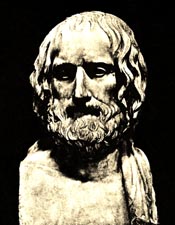Bacchae
, translated by Theodoridis, G., (contributor-contact-email)
Euripides’ Greek tragedy The Bacchae, was written towards the end of his life in Macedonia, under the reign of Archelaus I. The play was first performed posthumously in 405 BC, securing first place at the City Dionysia festival. Regarded as one of Euripides’ finest tragedies The Bacchae is notable for integrating the chorus with the narrative, and portraying Dionysus as a central, participatory deity.
Centring on the myth of King Pentheus of Thebes, his mother Agave, and their divine retribution by Dionysus, the play begins with Dionysus proclaiming his divine birth and his intent to establish Dionysian rites in Thebes to validate his lineage. The narrative culminates in a harrowing scene where Pentheus is dismembered by Theban women, including his mother, who presents his head on a spike to her father, Cadmus.
The play has been subject to diverse interpretations over time. Whilst initially seen as a testament to Euripides’ reverence for the divine, by the late 19th century it had become viewed as a continuation of his critique of Greek religious inadequacies. The play’s choral poetry and the depiction of Pentheus’ punishment reflect Euripides’ understanding of both the allure and the complexities of religious devotion.

Theodoridis, G.,
Support Open-Access:
Your contribution keeps our classical translations available to all. Every dollar helps support classics education and funds the expansion of our catalogue. Value what we do? Donate now.
File Downloads:
© Copyright, All Rights Reserved. This work may be freely reproduced, stored and transmitted, electronically or otherwise, for any non-commercial purpose. Conditions and Exceptions apply.